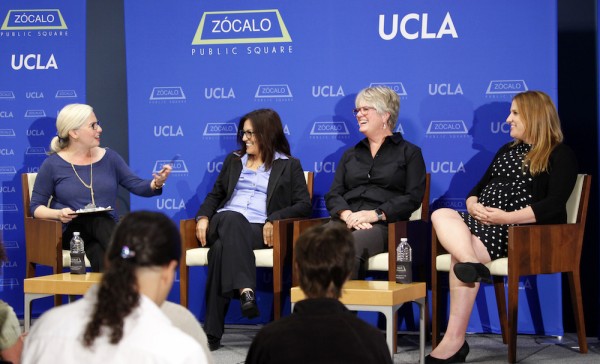Is the Internet Turning Kids Into Zombies? from Zocalo Public Square on Vimeo.
You can’t protect children from smartphones—but you can teach them how to use them in healthy ways, in part by modeling good behavior yourself, said panelists at a Zócalo/UCLA event at the RAND Corporation in Santa Monica, “Is the Internet Turning Our Kids Into Zombies?”
The panelists—UCLA Children’s Digital Media Center researcher Yalda Uhls, High Tech Los Angeles principal Marsha Rybin, and RAND educational policy researcher Lindsay Daugherty—dispensed advice and wrestled with how to strike a balance between preparing young people for a technological world while limiting technological overuse that can lead to addiction and anti-social behavior.
Uhls, author of the new book Media Moms & Digital Dads, noted that adult fears about the effects of technology on children are an old phenomenon. In the 1800s, adults worried about kids’ consumption of a popular new media: popular fiction. “Today, I would be so happy if my daughter read Jane Austen,” she said.
What’s different about digital media than previous technological changes, Uhls explained, is its rapid growth and the fact that even babies can use smartphones and touch screens. The speed of the technology adoption means that researchers have to play catch up to understand its impacts. “The stuff is moving so quickly that it’s taken a long time for us to understand how it’s affecting kids,” Uhls said.
Daugherty, the RAND researcher who has done policy briefs on effective technology use in early childhood education, struck a moderate line. She cautioned against hard and fast conclusions about the amount of internet and technology use, arguing that debating whether technology is good or bad is “the wrong conversation.” Instead, she said, we should evaluate technology by the purposes of its use and the quality of the education it inspires.
Even in preschools, “you can create technology or implement technology in a way … that really allows [children] to learn and move and have peer interactions,” Daugherty said. She saw a socioeconomic divide in how well children are trained to use technology, with upper- and middle-class parents doing more to make sure their children are using it for learning. And she urged early interventions to make sure even very young children are using technology in educational ways.
“If you can’t interact with technology, you can’t be a successful student. … It’s an important school-readiness skill in a lot of ways,” said Daugherty. “If you’re teaching a kid how to use a computer at age 7, they’re way far behind.”
Rybin, the founding principal of High Tech Los Angeles, a charter high school in Van Nuys, said she and her staff have talked extensively about how to encourage technological education in the school without being disruptive.
Recently, the school decided that students wouldn’t be permitted to have their phones on—and everyone has a phone, she noted, even though half the students are on free or reduced lunch. But the school guarantees tablets and home internet access to all students, so they message each other on those. And they use proxy services to go to social media sites that are supposed to be off-limits during the school day. “They are hacking because they can’t stop,” she said.
Still, the school goes to great lengths to make sure the students talk to each other, instead of just texting. “When we make them have these face-to-face conversations, they sometimes are a little uncomfortable,” she said. “But they do a lot of oral presentations, they do a lot of cooperative work, to get them out and talking.”
The discussion’s moderator, science journalist Eryn Brown, pressed the panelists on whether kids have digital needs. Daugherty said students need to develop the ability to filter information—separating reliable information from unreliable. Uhls said that young people need to “create a positive digital footprint”—basically an online persona—because colleges and employers will check for one. And Rybin said that students need parents to be looking over their shoulder—to have the password to their children’s phones, and to look at the texts and photos and social media messages they’re sharing.
During a lively question-and-answer session, the panelists said that media concerns about online predators and sexting are overblown. (Uhls also said there’s not yet enough research about the impacts of online pornography.)
One questioner asked whether today’s schools need mandatory classes in online and technological behavior, just as they have classes in health and sex education. Rybin noted that there is no such mandatory program, but that her school offers quite a bit of help, beginning with a boot camp for freshmen.
Uhls and Daugherty said thinking about technology and online behavior must be part of everything teachers and parents do with young people. “I think everybody has a little internet zombie in them,” Daugherty had mentioned earlier in the conversation. The best way for education to overcome this? “Integrate technology throughout the school,” she said, so that healthy technology use isn’t just a class assignment, but a part of everyday life.
*Photo by Aaron Salcido.










